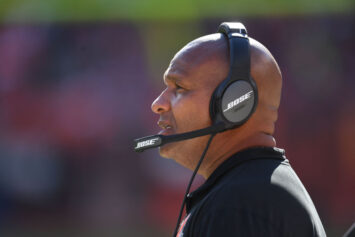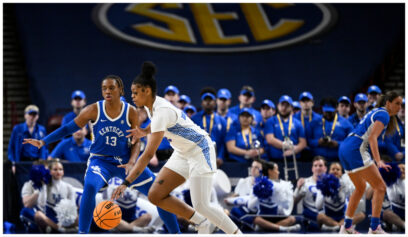In recent years, the Pac-12 has been on the outside looking in. But for black coaches, the Power 5 conference has become the best destination for career advancement.
When Chris Petersen shocked the college football world on Monday by announcing that he was stepping down after the University of Washington’s upcoming bowl game, it solidified the Pac-12 as the blackest Power 5 conference for head coaches, as defensive coordinator Jimmy Lake was given the reigns.
Lake’s hiring now gives the conference five black head coaches, as he joins David Shaw (Stanford), Mel Tucker (Colorado), Herm Edwards (Arizona State) and Kevin Sumlin (Arizona).
“I could not be more excited about taking over as head football coach at the University of Washington,” Lake said in a statement. “I’ve been dreaming of this opportunity for as long as I can remember and I can’t think of a better place to do it than in the world-class city of Seattle and at such a prestigious university with a rich football tradition. This wouldn’t be possible without the mentorship of Coach Petersen and I would like to thank him for everything he has done for me, as well as Jen Cohen for entrusting me with this opportunity.”
Lake joined forces with Petersen back in 2012 when he was at Boise State and has been Washington’s defensive coordinator for the last two seasons. He was formerly an NFL defensive backs coach for six years with the Detroit Lions and Tampa Bay Buccaneers. He reportedly has a five-year contract that starts at $3 million.
“It’s dear to me that another black coach was (promoted) to the head coaching spot, following a legendary coach like Coach (Petersen), and that it was a no-brainer,” said Gerald Alexander to The Athletic. Alexander played for Petersen at Boise State, serving as a defensive back for the Detroit Lions while Lake was on staff. “Somebody that looks like me is leading a team. That is significant for the aspiring black coaches in the profession. That’s a tremendous thing — at least how I view it.”
What’s going on out West is something we haven’t seen in the SEC, ACC, Big 10, and Big 12. Currently, the Big 10 has three black coaches in Jams Franklin (Penn State), Lovie Smith (Illinois), and Mike Locksley (Maryland). The ACC and SEC each have on in Dino Babers (Syracuse) and Derek Mason (Vanderbilt).
The Big 12 doesn’t have any.
At the beginning of the season, there were only 14 black head coaches out of the 130 schools on the FBS level. With the addition of Lake, and the firings of Willie Taggart (Florida State), Frank Wilson (UTSA), and Charlie Strong (USF), that number now stands at 12.
Over the past few years, much has been said, written, and discussed about the lack of black coaches on the collegiate and NFL levels, giving many to wonder why things are different in the Pac-12.
The simplest answer is the reduction of pressure on their coaches. The Pac-12 just wants to get into the College Football Playoff, the other conferences in the Power 5 are trying to win it.
Since the College Football Playoff started in 2014, the Pac-12 is last in appearances when it comes to Power 5 schools. The SEC leads the way with six appearances and is followed by the ACC (5), the Big 10 and Big 12 (3), and the Pac-12 (2). Oregon (2014) and Washington (2016) are the lone Pac-12 representatives to make it to the “Final Four.”
It’s also quite interesting that the most diverse conference has the fewest trips to the playoffs, while the tournament has never featured a team led by a black head coach.
The irony is that Lake is taking over at Washington. The place that made Tyrone Willingham the first black coach to ever get rehired at a major university after the Huskies chose him when Notre Dame fired him in 2004.
Earlier this season, I wrote about how Willingham’s failures may have led to more opportunities for black coaches, while also forcing them to deal with shorter windows of time to prove themselves.
For his career, Willingham was 76-88-1, including going 0-12 in his last season at Washington.
Jimmy Lake now has an opportunity to create his own legacy at Washington, and he may have Willingham to thank for that. But if things go sour and he finds himself on the hot seat sooner than later, then Willingham may also be to blame.



